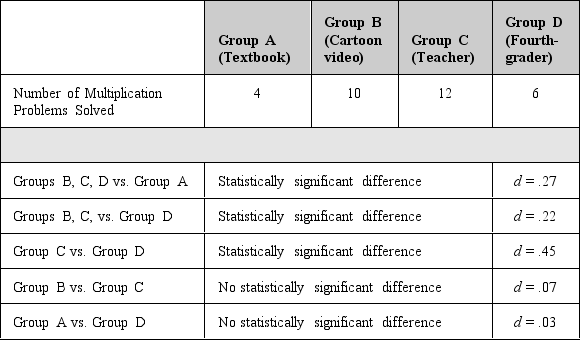Essay
Dr.Phillips is a cognitive-developmental psychologist who studies how children learn mathematical principles.His current interest is in studying how children learn multiplication.He recruits 54 second-graders who have not yet learned how to multiply numbers to participate in his study.He is curious as to whether different teaching styles lead to better mastery of the subject.One condition (A)involves having students read a chapter on multiplication from their textbook.One condition (B)involves having students watch a video of cartoon characters explaining multiplication.One condition (C)involves having students being taught multiplication from a teacher.One condition (D)involves having students being taught multiplication by a fourth-grader.In all conditions,participants spend 30 minutes learning the fundamentals of multiplication and are then given the same 15-question multiplication test.The number of questions answered correctly is recorded.The data are below.

-Based on the results of his study,Dr.Phillips hopes to make a causal statement.Explain how his study does or does not meet the three rules of causation.
Correct Answer:

Verified
Students should state the three rules fo...View Answer
Unlock this answer now
Get Access to more Verified Answers free of charge
Correct Answer:
Verified
View Answer
Unlock this answer now
Get Access to more Verified Answers free of charge
Q2: What is the primary difference between pretest/posttest
Q10: All of the following are advantages of
Q25: Which of the following research designs is
Q27: <br>Dr.Acitelli studies sleep and sleep disorders.She is
Q28: <br>Dr.Lonsbary is a cognitive psychologist who is
Q29: <br>Dr.Lonsbary is a cognitive psychologist who is
Q32: <br>Dr.Lonsbary is a cognitive psychologist who is
Q34: Random selection enhances _ and random assignment
Q35: The ability for a study to reveal
Q64: Define manipulation checks and pilot studies, and